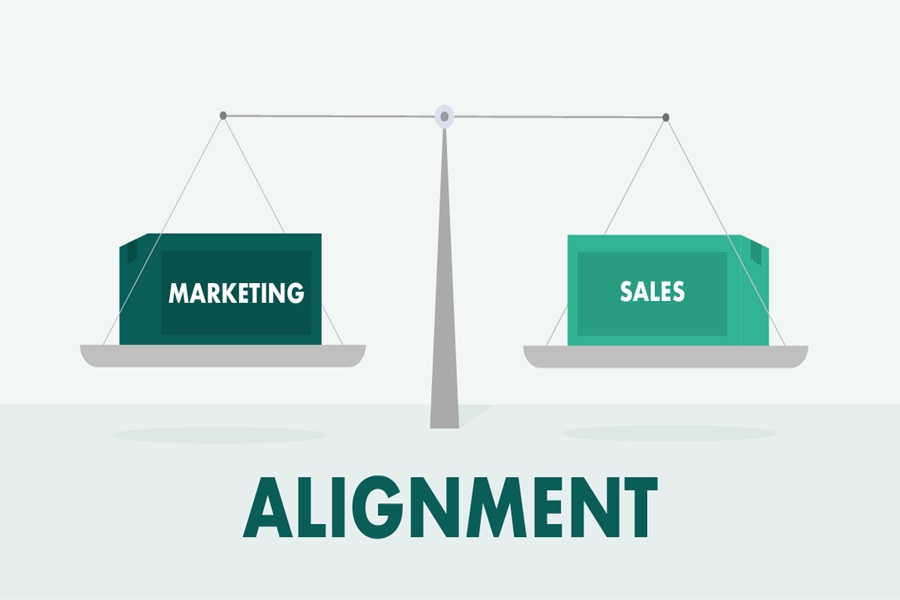Marketing and sales, though distinct in their skill sets, share a common objective: acquiring new business and nurturing customer relationships for long-term growth. When these teams collaborate effectively, this process is consistent. However, when there’s a lack of alignment, they might pursue accounts that don’t match their ideal customer profile, and they may miss opportunities to expand relationships beyond the initial sale.
Customer relationship management (CRM) offers a solution to these challenges by taking a holistic approach to lead management, customer relationships, and customer retention. It’s most effective when marketing and sales are in sync.
Let’s delve into the relationship between marketing and sales and explore how a CRM strategy can enhance their collaboration, enabling them to target the right accounts, engage all decision-makers in the buying process, and cultivate enduring customer relationships.
A sales and marketing relationship: Two teams with one goal
Sales and marketing may seem like distinct entities within a company, but their ultimate goal is the same: driving revenue. Marketing efforts aim to create awareness, generate leads, and nurture prospects, while sales focus on converting these leads into paying customers. Achieving this goal requires both teams to work together consistently.
CRM: a catalyst for the successful collaboration of two teams
CRM, or Customer Relationship Management, is a powerful tool to facilitate sales and marketing alignment. It provides a centralized platform for storing and managing customer data, interactions, and communication. By utilizing CRM effectively, both teams can access the same information and coordinate their efforts more efficiently.
The importance of CRM in Sales and Marketing Relationship
CRM plays a pivotal role in enhancing the relationship between sales and marketing in numerous ways, ultimately contributing to the success of an organization. Some of the factors CRM can use to help nurture this collaboration can be:
Data Centralization:
- Importance: CRM systems serve as a centralized hub for storing and managing customer-related data. It includes contact information, interaction history, purchase history, and more. When both sales and marketing have access to this centralized database, it ensures that they are working with the same, accurate information.
- Benefits: Data centralization eliminates the need for duplicative data entry, reduces errors, and provides a single source of truth for customer information. This consistency is crucial for aligning sales and marketing efforts and ensuring they’re both on the same page regarding customer data.
Improved Communication:
- Importance: Effective communication is key for collaboration between sales and marketing. CRM systems often include communication tools like email integration, notes, and shared calendars, which facilitate real-time interaction and collaboration between the two teams.
- Benefits: Improved communication allows sales and marketing teams to coordinate their efforts, share insights, and align strategies. This prevents misunderstandings, improves teamwork, and ensures that the customer receives consistent and timely messages.
Lead Management:
- Importance: CRM systems provide lead management features that enable marketing to track the entire lead lifecycle, from initial contact to potential conversion. This data is crucial for sales, as it helps them understand the lead’s level of engagement and interest.
- Benefits: Lead management helps marketing identify high-quality leads and pass them to sales at the right moment. Sales, in turn, can tailor their approach to suit the lead’s stage in the buying process, increasing the likelihood of conversion.
Customer Segmentation:
- Importance: Customer segmentation involves categorizing the customer base into distinct groups based on demographics, behavior, or other criteria. This is a fundamental marketing strategy to target the right customers with the right messages.
- Benefits: CRM systems provide the tools to segment the customer base accurately. Marketing can then create highly targeted and relevant campaigns, and sales can approach leads with a more personalized sales pitch, improving conversion rates and customer satisfaction.
Analytics and Reporting:
- Importance: CRM systems offer robust analytics and reporting capabilities, allowing both sales and marketing to assess the effectiveness of their strategies, track performance, and make data-driven decisions.
- Benefits: Access to data-driven insights helps teams measure the ROI of their efforts, identify what’s working and what needs improvement, and adapt strategies accordingly. This contributes to the overall success of the organization.
Sales Forecasting:
- Importance: Accurate sales forecasting is vital for planning and resource allocation. CRM systems provide the historical data, pipeline visibility, and deal progress insights required for forecasting.
- Benefits: Sales forecasting helps both sales and marketing teams understand the sales cycle, make informed decisions about resource allocation, and plan marketing campaigns to coincide with anticipated sales opportunities. This enhances efficiency and revenue generation.
Customer Retention:
- Importance: Customer retention is as important as customer acquisition. CRM systems allow both teams to track post-sale interactions, monitor customer satisfaction, and identify opportunities for upselling or cross-selling.
- Benefits: By nurturing existing customer relationships, businesses can increase customer lifetime value and reduce churn. CRM enables targeted efforts to keep customers engaged and satisfied, ultimately leading to long-term success.
Efficiency and Productivity:
- Importance: CRM automates many routine and administrative tasks, such as data entry, lead scoring, and follow-ups, freeing up valuable time for both sales and marketing teams.
- Benefits: Improved efficiency and productivity mean that teams can focus on higher-value activities, such as engaging with leads and customers, crafting better marketing campaigns, and closing deals, which ultimately leads to increased revenue and improved customer relationships.
Scalability:
- Importance: As businesses grow, they need systems that can scale with them to accommodate an expanding customer base and evolving needs.
- Benefits: CRM systems are designed to grow with your business, providing the flexibility and scalability to handle increased data and users. This ensures that as your organization expands, your CRM system can continue to support the sales and marketing relationship effectively.
Collaborate for success with these tips
Some of the bonus tips you can use to create a perfect collaboration are:
Define Shared Goals and KPIs:
Establish common objectives and key performance indicators (KPIs) that both sales and marketing can work toward. This ensures that both teams are aligned in their efforts and are driving toward the same outcomes, such as lead generation, revenue growth, or customer retention.
Frequent Communication and Feedback:
Encourage regular and open communication between sales and marketing teams. Schedule meetings to discuss progress, challenges, and successes. Foster a culture of feedback where both teams provide insights on lead quality, campaign effectiveness, and customer feedback.
Lead Qualification and Scoring:
Develop clear criteria for lead qualification and scoring. This helps in identifying high-potential leads and ensures that sales are focused on prospects with the greatest likelihood of conversion. Use your CRM system to automate this process and ensure consistency.
Content Collaboration:
Collaborate on content creation and messaging. Ensure that marketing produces content that is not only engaging but also aligned with the needs and questions of potential customers. Sales can provide valuable input based on their interactions with leads and customers.
Closed-Loop Reporting:
Implement a closed-loop reporting system to track the performance of marketing campaigns and lead generation efforts. It means tracking leads from the moment they are generated to their final conversion and post-sale activities. Analyzing this data together helps both teams refine their strategies and make data-driven decisions.
The alignment of sales and marketing through CRM is a fundamental strategy for businesses aiming to increase revenue and build long-lasting customer relationships. By recognizing that both teams share the common goal of driving business growth, organizations can leverage CRM as a catalyst for success.
This collaborative approach not only targets the right accounts and engages decision-makers but also builds strong and enduring customer relationships. Ultimately, it leads to increased revenue and sustained success for the organization.





